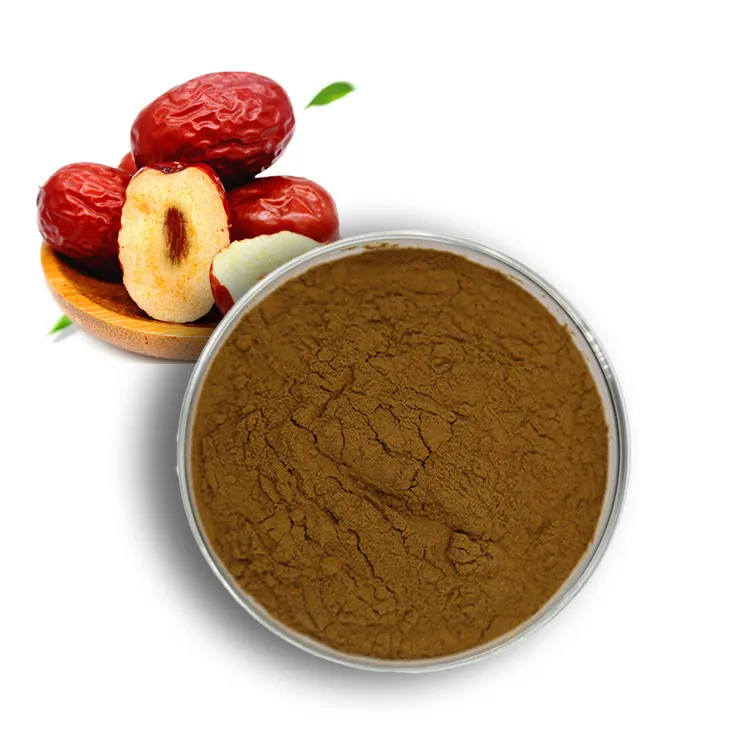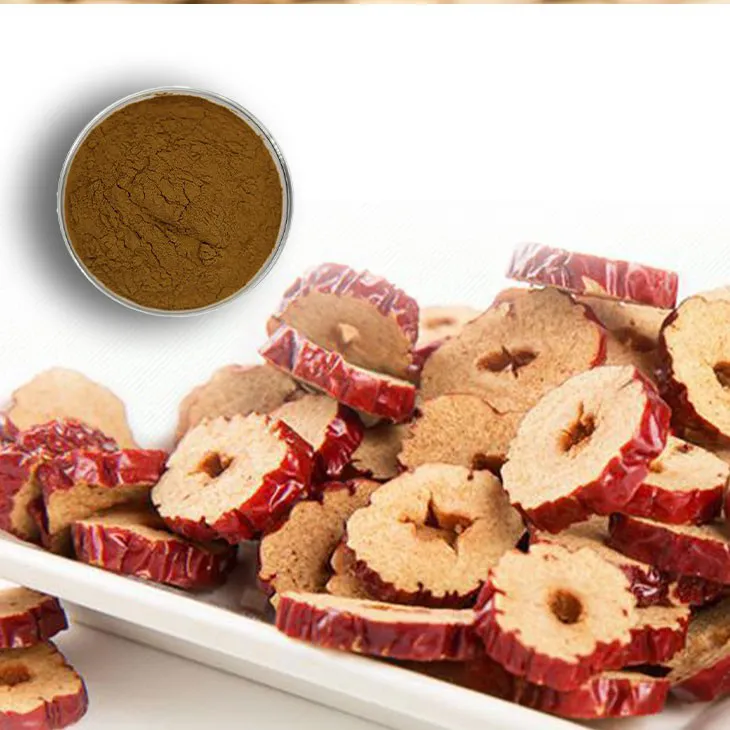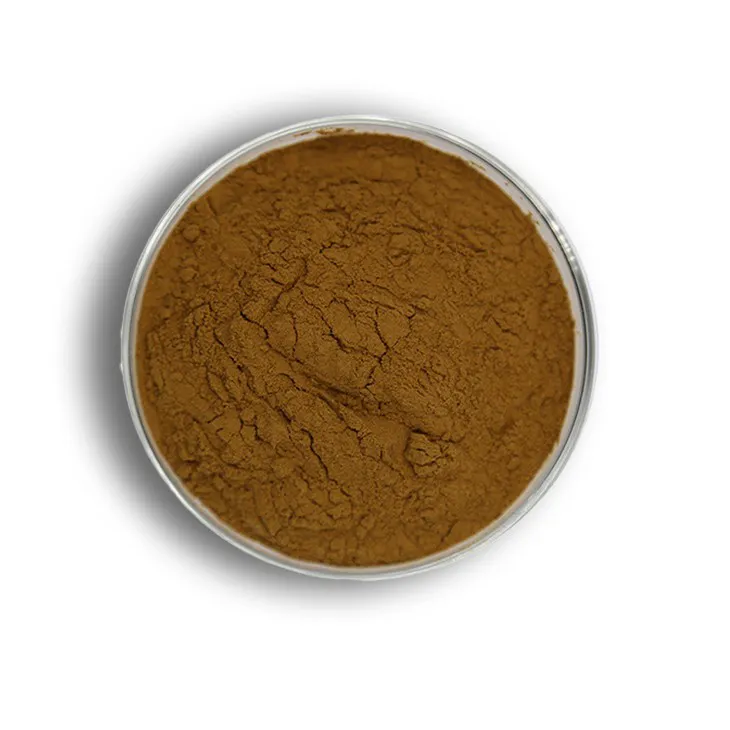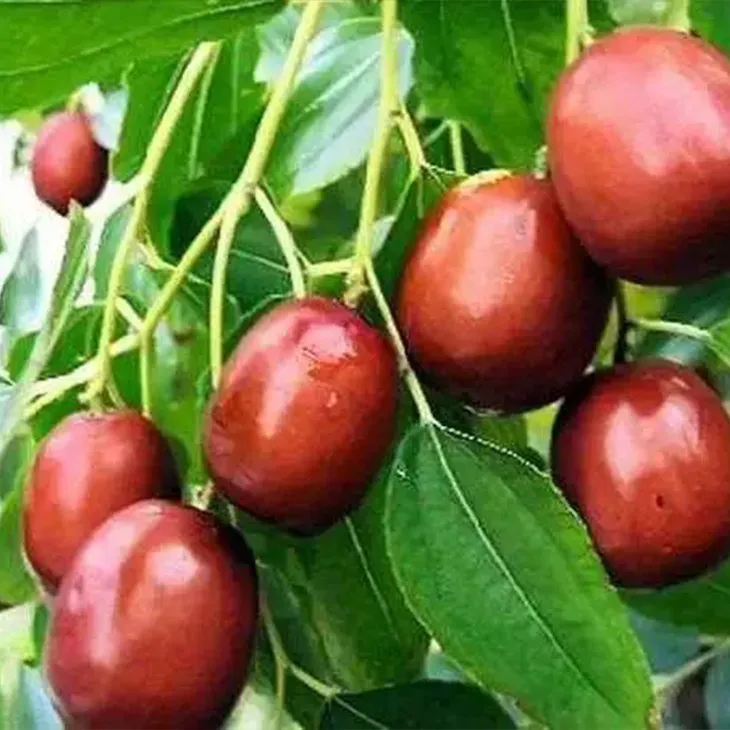- 0086-571-85302990
- sales@greenskybio.com
Extract jujube extract by steam distillation.
2024-11-27

1. Introduction
Jujubes, also known as Chinese dates, have been used in traditional medicine and cuisine for centuries. These small fruits are rich in various bioactive compounds, which make them a valuable source for extraction. Steam distillation is one of the prominent methods for obtaining Jujube Extract. This extraction method offers a way to isolate and concentrate the beneficial components present in jujubes without causing significant degradation. In this comprehensive study, we will explore the details of steam distillation of Jujube Extract, including the process, the resulting chemical composition, and its potential applications.

2. The Steam Distillation Process
2.1 Principle
Steam distillation is based on the principle that when steam is passed through a matrix containing the jujube material, the volatile compounds present in the jujube get vaporized along with the steam. This is because the total vapor pressure of the mixture of steam and the volatile compounds is equal to the sum of their individual vapor pressures. Since the boiling point of the mixture is lower than the boiling point of the individual components in many cases, the volatile compounds can be vaporized at a temperature lower than their normal boiling points. For jujubes, this allows for the extraction of heat - sensitive compounds without excessive thermal degradation.
2.2 Equipment
The basic equipment required for steam distillation of Jujube Extract includes a steam generator, a distillation flask, a condenser, and a collection vessel. The steam generator provides the steam which is then passed into the distillation flask containing the crushed or powdered jujube sample. The condenser cools the vapor mixture of steam and volatile compounds, causing them to condense back into a liquid state. The collection vessel is used to collect the condensed extract.
2.3 Procedure
- First, the jujubes are carefully selected, washed, and dried. Drying is an important step as excessive moisture in the sample can affect the efficiency of the distillation process.
- The dried jujubes are then crushed or ground into a fine powder. This increases the surface area available for interaction with the steam, enhancing the extraction efficiency.
- The powdered jujube sample is placed into the distillation flask. The steam generator is started, and steam is slowly introduced into the flask. The rate of steam introduction should be carefully controlled to ensure proper extraction without causing the sample to be flushed out of the flask too quickly.
- As the steam passes through the jujube sample, the volatile compounds are vaporized and carried along with the steam. The vapor mixture then enters the condenser where it is cooled. The condenser is usually cooled by a coolant such as water flowing through its outer jacket.
- The condensed liquid, which is the jujube extract, is collected in the collection vessel. This extract may contain water along with the volatile compounds, and further separation or purification steps may be required depending on the intended use of the extract.

3. Optimal Conditions for Steam Distillation
3.1 Temperature
The temperature plays a crucial role in steam distillation of jujube extract. Generally, a temperature range of 100 - 120°C is often considered suitable. At lower temperatures, the vaporization of volatile compounds may be incomplete, leading to a lower yield of the extract. However, if the temperature is too high, it can cause thermal degradation of some of the bioactive compounds in the jujube. For example, certain phenolic compounds present in jujubes are sensitive to high temperatures and may lose their antioxidant properties if exposed to excessive heat during distillation.
3.2 Pressure
While steam distillation can be carried out at atmospheric pressure, in some cases, slightly reduced or increased pressure can be used to optimize the process. Reducing the pressure can lower the boiling point of the mixture, which may be beneficial for the extraction of more heat - sensitive compounds. However, it also requires more complex equipment and careful control. On the other hand, increasing the pressure can speed up the process, but it may also increase the risk of thermal degradation.
3.3 Duration
The duration of the steam distillation process depends on various factors such as the amount of jujube sample, the efficiency of the equipment, and the desired concentration of the extract. Typically, a distillation time ranging from 2 - 6 hours is common. Longer distillation times may lead to a higher yield of the extract, but it also increases the risk of degradation of the bioactive compounds. Shorter times may result in incomplete extraction.

4. Chemical Composition of Jujube Extract Obtained by Steam Distillation
The jujube extract obtained through steam distillation contains a variety of chemical compounds. Volatile oils are one of the major components. These volatile oils often contain terpenes, which contribute to the characteristic aroma of the jujube extract. For example, α - pinene and β - pinene are some of the terpenes that may be present. Additionally, aldehydes and ketones are also found in the extract. These compounds can have various biological activities.
Another important group of compounds in the jujube extract are phenolic compounds. Although steam distillation may not extract all phenolic compounds as effectively as some other extraction methods, certain phenolic acids such as caffeic acid and ferulic acid can still be found in the extract. These phenolic compounds are known for their antioxidant, anti - inflammatory, and antimicrobial properties.
Some esters may also be present in the jujube extract. Esters can contribute to the flavor and aroma of the extract. They are formed from the reaction between alcohols and carboxylic acids present in the jujube.

5. Potential Applications of Jujube Extract in Promoting Health
5.1 Antioxidant Activity
The phenolic compounds present in the jujube extract obtained by steam distillation contribute to its antioxidant activity. Antioxidants are important for neutralizing free radicals in the body. Free radicals are highly reactive molecules that can cause damage to cells, proteins, and DNA. By consuming jujube extract, which is rich in antioxidants, the body can be protected from oxidative stress - related diseases such as cancer, cardiovascular diseases, and neurodegenerative diseases.
5.2 Anti - inflammatory Effects
Both the phenolic compounds and some of the volatile oils in the jujube extract have anti - inflammatory properties. Inflammation is a natural response of the body to injury or infection, but chronic inflammation can lead to various health problems. Jujube extract can help in reducing inflammation by inhibiting the production of inflammatory mediators such as cytokines and prostaglandins.
5.3 Immune - boosting Properties
The bioactive compounds in jujube extract can also enhance the immune system. They can stimulate the production of immune cells such as lymphocytes and macrophages, which play a crucial role in defending the body against pathogens. This immune - boosting effect can help in preventing infections and improving overall health.
6. Potential Applications of Jujube Extract in Industrial Manufacturing
6.1 Food and Beverage Industry
In the food and beverage industry, jujube extract can be used as a natural flavoring agent. Its characteristic aroma and flavor can enhance the taste of various products such as juices, jams, and baked goods. The antioxidant properties of the extract can also be used to extend the shelf life of food products by preventing lipid oxidation.
6.2 Cosmetics and Perfumery
The volatile oils present in the jujube extract make it suitable for use in cosmetics and perfumery. The pleasant aroma can be used in perfumes, while in cosmetics, the antioxidant and anti - inflammatory properties of the extract can be beneficial for skin health. For example, it can be used in creams and lotions to protect the skin from oxidative damage and inflammation.
6.3 Pharmaceutical Industry
Jujube extract has potential applications in the pharmaceutical industry. The bioactive compounds with antioxidant, anti - inflammatory, and immune - boosting properties can be further studied and developed into drugs or dietary supplements. For example, it may be used in the development of new anti - inflammatory drugs or as an ingredient in dietary supplements for immune support.
7. Conclusion
Steam distillation is a valuable method for extracting jujube extract. By understanding the optimal conditions for the distillation process, the chemical composition of the extract, and its potential applications in health promotion and industrial manufacturing, we can better utilize this natural resource. Jujube extract obtained through steam distillation has great potential in various fields, from improving human health to enhancing the quality of consumer products. However, further research is still needed to fully explore its potential and to develop more efficient extraction and purification methods.
FAQ:
What are the optimal temperature and pressure conditions for steam distillation of jujube extract?
The optimal temperature and pressure conditions can vary depending on several factors. Generally, a temperature range of around 100 - 150°C might be suitable, but it also depends on the equipment used and the specific requirements for extracting different compounds. The pressure is often maintained at normal atmospheric pressure, but in some cases, a slightly reduced pressure can enhance the distillation process. However, precise determination often requires experimental optimization based on the quality of jujubes and the desired chemical composition of the extract.
What are the main chemical components in the jujube extract obtained by steam distillation?
The main chemical components may include various volatile compounds such as terpenes, esters, and aldehydes. Additionally, there could be some phenolic compounds that are also carried over during the steam distillation process. These components contribute to the unique aroma and potentially some of the health - promoting properties of the jujube extract.
How does the steam distillation process affect the antioxidant properties of jujube extract?
The steam distillation process can have both positive and negative impacts on the antioxidant properties. On one hand, some antioxidant - rich volatile compounds are effectively extracted, which can contribute to the overall antioxidant activity. On the other hand, if the process is too harsh, it may cause the degradation of some heat - sensitive antioxidant compounds. Thus, proper control of the distillation conditions is crucial to maintain or enhance the antioxidant properties.
What are the potential applications of jujube extract in the food industry?
In the food industry, jujube extract can be used as a natural flavoring agent due to its unique aroma. It can also be added to certain products for its potential health - promoting properties, such as in functional foods or dietary supplements. Additionally, it may have preservative effects in some food products because of its antioxidant and antimicrobial components.
How can the quality of jujube extract obtained by steam distillation be evaluated?
The quality can be evaluated through several methods. Chemical analysis can be used to determine the concentration and identity of key chemical components. Spectroscopic techniques such as UV - Vis spectroscopy or infrared spectroscopy can provide information about the chemical structure and purity. Additionally, biological assays can be conducted to assess its antioxidant, antimicrobial, or other functional properties.
Related literature
- Steam Distillation of Plant Extracts: Principles and Applications"
- "Jujube: Chemical Composition and Therapeutic Potential"
- "Extraction Techniques for Bioactive Compounds from Fruits: A Review with Focus on Jujube"
- ▶ Hesperidin
- ▶ citrus bioflavonoids
- ▶ plant extract
- ▶ lycopene
- ▶ Diosmin
- ▶ Grape seed extract
- ▶ Sea buckthorn Juice Powder
- ▶ Beetroot powder
- ▶ Hops Extract
- ▶ Artichoke Extract
- ▶ Reishi mushroom extract
- ▶ Astaxanthin
- ▶ Green Tea Extract
- ▶ Curcumin Extract
- ▶ Horse Chestnut Extract
- ▶ Other Problems
- ▶ Boswellia Serrata Extract
- ▶ Resveratrol Extract
- ▶ Marigold Extract
- ▶ Grape Leaf Extract
- ▶ blog3
- ▶ blog4
-
Nature's best β - carotene.
2024-11-27
-
Standard - process Coenzyme Q10.
2024-11-27
-
Bulk purchase of pomegranate extract.
2024-11-27
-
Extraction process of bilberry extract.
2024-11-27
-
Manufacturers of Euphrasia Extract.
2024-11-27
-
Chinese peppermint oil powder factories.
2024-11-27
-
Red Wine Extract
2024-11-27
-
Golden Seal Extract
2024-11-27
-
Kidney Bean Extract
2024-11-27
-
Longan Extract
2024-11-27
-
Curcumin Extract
2024-11-27
-
Mango flavored powder
2024-11-27
-
Chaste Berry Extract
2024-11-27
-
Shikonin
2024-11-27
-
Artichoke Extract
2024-11-27
-
Peppermint Oil
2024-11-27





















